
Recently on Cyclingnews.com |
An interview with Theo De Rooy, July 1, 2006
View from the sidelines
For Theo De Rooy, general manager of the Rabobank cycling team, each of his 22 or 23 Tours de France (he's lost count) he has either ridden in or directed are now memories, he says. He's very much a man with a focus on the now and the future, and that's how he's managed to sooth Thomas Dekker's disappointment after being replaced at the last minute, and at the same time, keep his two Dutch veteran thirty-somethings Erik Dekker and Michael Boogerd feel as if they were racing their first Tour de France. Cyclingnews' Anthony Tan caught up with De Rooy at the team's presentation in Valkenburg.
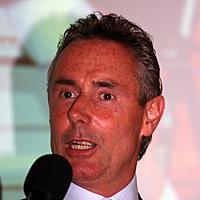
|
CN: Are you very confident of the team that you're sending to this year's Tour de France?
TDR: Ya. If we start with Denis Menchov, last year his preparation for the Tour was not 100 percent. He was not 100 percent in the Dauphiné; when we were training in the mountains before the Tour, he was not 100 percent; and when we reached the Tour, he was not 100 percent. But luckily we had Weening and Rasmussen, so it was not very visible, because we had others who were performing well.
This year, Denis did a very good Dauphiné; he did some mountain stages afterwards and he's still feeling very good. Last year, he won the Vuelta and he certainly wants to prove that his Vuelta victory last year was not because of luck or because of the disqualification of Heras, but that he's just a very good rider.
The second rider, Oscar Freire, he abandoned last year's Tour of Switzerland on June 16, and he didn't race again until Majorca this year. The last couple of months has been going fairly good with Oscar; in the Spring Classics, he lacked a little top form, but if you haven't raced for three quarters of the year...
We had to establish after the Spring Classics that he was missing a few percent to achieve 100 percent form. But in Switzerland this year, the way he won the stage, I think we can expect the old Oscar Freire again in the Tour de France.
Another rider to pick is Michael Boogerd - national champion, going well; Erik Dekker, very motivated; Rasmussen, problems the last few weeks, but we're still confident that he'll be there in the Tour. And with Bram de Groot as a replacement for Thomas Dekker, Joost Posthuma, Pieter Weening and Juan Antonio Flecha, we have riders capable of working for the team, but also capable of doing something for themselves if there is an opportunity.
CN: Is that something you'll have to manage - balancing the interests of going for a stage win and helping your GC riders? Because you have other teams who have eight riders all riding for one man...
"... a cycling career is full of setbacks - mainly setbacks - and sometimes successes."- Theo De Rooy on the disappointment Thomas Dekker faced when he found out he was no longer part of the Rabobank's Tour de France team |
TDR: It's obvious that Menchov is the leader of the team - so when it really comes [down] to it, everybody will be working for Menchov, especially in the last week of the Tour in the mountains.
On the flat stages, he will always have riders protecting him, and you know how it is in the breakaway stages - there is always attacking in the first part of the stage, you have riders jumping in the breakaways, and when the breakaway is gone, everybody is protecting Menchov again. You can always have one or two riders taking care of Menchov.
On the other hand, Menchov is not a Tour favourite. We are not one of the teams expected to take immediate responsibility when there is a situation - there are other teams like CSC and T-Mobile where the situation is a little different, because they have the big favourites and they have the pressure of the race, day-in, day-out.
CN: Menchov tailed off a little towards the end of the Dauphiné this year, so was he riding at 100 percent there?
TDR: I don't think he was 100 percent, because at the Dauphiné, you are always at the stage of building up your form for the Tour de France. The stage where he lost a few minutes, he had a crash and he came back to the car a couple of times asking for glucose, so he was getting a little empty.
But I think the crash was, let's say, the final blow... At the foot of the last climb, he immediately lost contact, but then we saw on the second part of the climb he was gaining momentum and was able to follow Hincapie's group, so the loss was less than we expected.
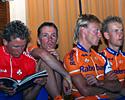
|
CN: And what about Bram de Groot replacing Thomas Dekker - what brought about the change?
TDR: Thomas did a very good spring season with Tirreno and did some good Classics, like Liège-Bastogne-Liège. But after Liège, he told us he was feeling tired. Until that moment, we never saw or never heard Thomas Dekker saying he was tired - he was always fresh, always feeling good, doing things with his natural talent.
We gave him some rest after the Spring Classics, and he did some good rest and training with his trainer. He came into competition again at the Dauphiné, and we saw his time trials were not like they were before, so after Dauphiné, he took some rest and we hoped with the rest and some new training, that he would recover.
We saw at the ProTour team time trial he was good, but not like the Thomas we knew before. Last Tuesday, in the Dutch time trial championships, he lost almost two minutes to the winner, which, for him, was quite dramatic.
We already discussed among us [team managers] that we were worried about him. He is 21 years old, with such huge ambitions to do the Tour de France, and such a good rider - but then again, only 21. We know what the Tour de France is all about; we know in the first week of the Tour de France, riding in the peloton is one of the most difficult aspects in professional cycling. And if such a young, motivated rider is having doubts in his head, then you have to ask, 'Is it smart to let a rider like that go to the Tour de France?'
We didn't want to give the signal last week; we thought it would be best to wait until the national championships to see how he was going at the nationals. If he had been very good [in the road race], then okay, maybe we saw the signs incorrectly - but we didn't see a good Thomas Dekker that day. We also contacted his trainer, and his trainer was also saying it was not the Thomas he knew before.
So we just asked him yesterday after the race, 'How are you feeling, what are you thinking?' - and he was having doubts, so we agreed the best decision was to pull him out [of the Tour de France]. Because I mean, a 21 year-old guy like him, so talented, so motivated, to let him go in such a difficult race... you have to be fresh at the start, ambitious, convinced, eager, eager to work, eager to perform for the team - but if, less than a week before the Tour, you are having your doubts, it's...
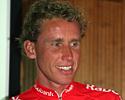
|
CN: Not the place to be...
TDR: No.
CN: So is it down to something physical, is it a problem, or do you think he just needs some rest?
TDR: We have two Dekkers on the team. With the young Dekker, everything has been going upwards since he was a junior. I think this is the first moment where he has a setback, where he has to experience something working out the way he always thought it would work out. If you see the second Dekker, he said, 'In 10 years of cycling, I only had two years where I didn't experience problems with fractures, or injuries, whatever' - so that means a cycling career is full of setbacks - mainly setbacks - and sometimes successes.
With such a young, talented rider, there will be for sure a moment where the setbacks will start - and he will have a lot more setbacks in his life, in his career - but you never you when they are coming.
CN: How did Thomas take the news that you decided to replace him with Bram de Groot?
TDR: He was very disappointed. But also, in his heart, in his head, he must of felt some relief. It was a very courageous decision, and almost immediately after the decision, he already started thinking about the rest of the season and the rest of the program, saying, 'Well, we can do this or that race'.
"... especially Dekker and Boogerd, they were standing at the start line like they were junior riders - a heartbeat of 120, waiting for the start, then 'Whoof!'"- De Rooy recalls the excited faces of Erik Dekker and Michael Boogerd at the Dutch national championships. "I think we still need those guys," he says |
CN: How do you feel when you see images coming on to the screen of Dekker and Boogerd, and they look at the screen like they were still 17 years old? That must make you feel good, that they look like kids entering their first Tour de France.
TDR: That's true. They are still racing as young kids!
Like the way we did the national championships, both Dekker and Boogerd and the rest of the team, but especially Dekker and Boogerd, they were standing at the start line like they were junior riders - a heartbeat of 120, waiting for the start, then 'Whoof!', full gas y'know, like, 'Let's see if we can make a decisive split on the first lap of this circuit'.
That's the quality of these riders. As far as Erik Dekker was concerned, the strange thing is, two or three years ago, he was already expressing his doubts about whether he will do another Tour de France, saying, 'Well, I don't know, I've already done so many Tours de France, I think this will be my last... '
This year, there was never a trace of a doubt that he would do the Tour or not: he was motivated to go to the Tour from the first moment on. I think we still need those guys.
CN: What about yourself - after so many years as a rider then team manager, when you arrive in Strasbourg, will you still feel the same sensations that you're excited to be there, and ready to direct the team for three weeks?
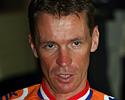
|
TDR: Well, to be specific, it will be Breukink and Maassen directing the team in France for three and a half weeks. I will be there in the first week, then working at home, but I will come back once or twice or whenever necessary.
For me, I see the Tour from a different angle now as a sports director. I think I've ever ridden or directed 22 or 23 Tours de France, I don't know, but they are now memories. It's the most important event of the year, and now I am just managing everything around it - the pressure, the demands of everybody who wants to be in the Tour... For me, the Tour has changed over the years.
CN: But do you still enjoy what you do, despite the change?
TDR: I still enjoy what I do very much. Sometimes it takes managing things from a distance to give you a new perspective on the sport. Every angle and every experience is something special... to do it as a rider, to do it as a manager, to do it as a sports director.
Like the stage that Weening won last year, I was sitting at home in front of my television - and I was so happy. If you're sitting in the car, the television might not be working, you are in a deviation, and then X million people already saw it and you know nothing. A lot of people ask me, 'Hey, it must be disappointing for you, not to be there' - and I say, 'No, it's better in front of the television!' (laughs)
CN: How important was it to win the national champion's jersey after a two-year absence?
TDR: We had a national championship race the last few years on a 100 percent flat circuit, with very wide roads. A team with our qualities, we can't race on a circuit like that, because everybody is focusing on us, and if you don't even have a bridge or a hill to make a difference, or to do something tactical... any rider - even one 45 years old - with a little training can stay on a wheel, and everyone is always following Rabobank, then it's tactically very difficult to win a race.
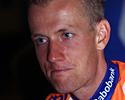
|
Of course, the press, the spectators, the [other] riders are focusing on Rabobank, because they have to win; if they win, it's normal, and if we don't win, we become the laughing stock. We start with 12 riders [from Rabobank]; in other countries, they start with teams of 20, 25 riders. 12 riders against 5 from Quick.Step, 7 from Skil-Shimano, and there are some good individual riders - it's not obvious that you will win the race.
And for us, it's important to have the jersey, to have the jersey in the Tour de France, because it will create some calm in the week before the Tour. Last year, the nationals were not good for us, and there was some discussion, like, 'they were not good in Dauphiné, they were not good in Switzerland, national championship was a disaster... what the heck are they going to do in the Tour de France?'
Of course, those things have nothing to do with the other thing, but winning the nationals will create calm: we have the jersey, now we can focus on the Tour, and everything is in perspective.
CN: Just on the subject of the press in the Netherlands; I know in Belgium, they are very critical and sometimes sensationalise things - how do you find the Dutch press - are they also too eager to write a story about nothing?
TDR: It's part of our job. It's normal that if there is just one major Dutch team, one important Dutch pro cycling team, the focus is on us. And we also stir up expectations: if it doesn't work out, then ya, you can expect some headwind (smiles); sometimes the tree starts moving, and you just have to make sure the tree does not fall down. It's normal, it's part of the job, and it's always important to look towards the future, and to be critical of your own organisation.
CN: When the Tour de France finishes in Paris three and a half weeks from now, what will you be happy with?
TDR: In the initial part of the Tour, a stage win would be super to settle the team; it's one of the best things that can happen to a team, to have a stage win in the beginning of the Tour. It would put things in perspective, and then we can start working in the mountains with Menchov and Rasmussen.
We can say we want Menchov to finish in place X or Y, but it's also important the way it happens. He's capable of winning a stage like he did in Dauphiné and get a good placing in the overall classification. And Rasmussen, getting close to what he did last year would be super.
But that's also the nice thing about cycling; Dekker won three stage in 2000 - who could have ever predicted that would happen? And what Weening did last year, winning a stage by nine-tenths of a millimetre, who would have said that would've happened? Ah, let's keep those things as ambitions, as hopes... it's always nice to see unexpected things happen in a positive way.
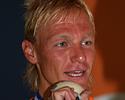
|
CN: Last question: if someone gave you 100,000 Euro, who would you put your money on to win the Tour de France this year?
TDR: 100,000 Euros?
CN: Yes.
TDR: Well, I think I'd take the money and go to the Bahamas! (laughs)
CN: We're here at the Holland Casino; black is Ullrich and red is Basso...
TDR: Black.
Editor's note: The interview with Theo De Rooy was conducted on Monday, June 26, prior to the dramatic events the day before the start of the Tour de France in Strasbourg. Maybe De Rooy should go on that holiday to the Bahamas after all...

